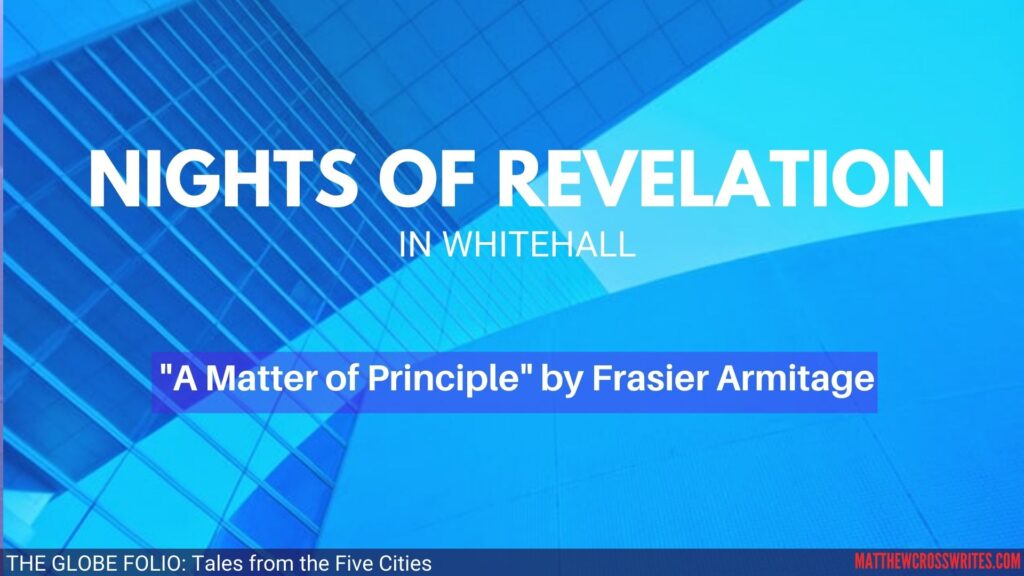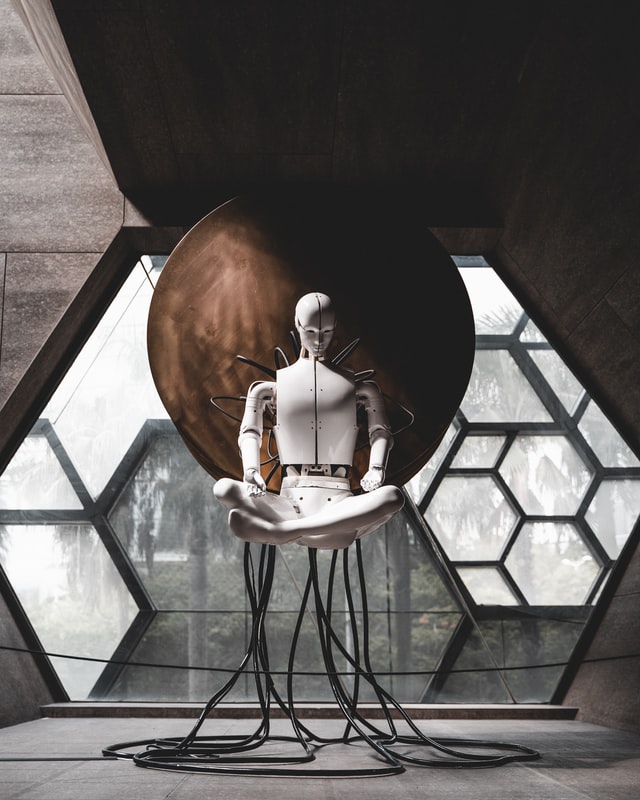
A Matter of Details
BY MATTHEW CROSS
The Right Honorable Flavius, Mayor of Whitehall, Protector of the Gates and Keeper of the Seals, picked his nose thoughtfully. Ever since tramping outside the walls to that godforsaken Polity lander in the savagelands, his allergies had been acting up. He had a headache, his sinuses were clogged, and he was in an overall foul temper. As Whitehallers say, no good comes from leaving the gates of the First City.
And the protests did not help. A mob of protestors– an actual mob in Whitehall!–gathered every morning and ranted and raved outside Central Tower until very late at night. Flavius never had to see them in person, of course. He lived in the Mayor’s Mansion in Central Tower and took the elevator down to the Mayor’s Office in Central Tower. But even so, the news vids ran nonstop footage of the protests.
Flavius flicked the large gob of phlegm at the trash bin. The booger stretched and twisted as it flew and splatted on the trash bin lid. The bin’s automatic sensors should have detected the booger’s flight and opened smoothly to catch the offending gob.
Flavius sighed. He flipped the tiny lever for his desk chair to roll him to the trash bin. From his lace-filled sleeve, he flourished a large, white handkerchief and leaned forward to wipe up the mess. As he bent, he noted the silvery, blinking light from the corner of his eye. He sat up and leaned back in his chair to watch what would happen.

Photo by Nicolas Picard
In the topmost corner of the coffered ceiling of his spacious office was a spider’s web. The silvery light cascaded across its surface, expanding in concentric rings from the center. Flavius had installed the lights as a notification system. It was unnecessary, of course, because the web also sent a signal to the comp on his desk, but he liked the little touches on his works of art. Details matter. The mechanical spider was already making its way silently down the wall to check out the top of the trash bin.
The spider was his own invention, of course. The web was actually a radio dish that monitored the room, and the spider was a hunter-seeker of bugs. It found spying threats and destroyed them. Not that Flavius was overly worried about microbot spies. After all, he was still the leading microbot scientist in Whitehall. Despite his mayoral duties, he retained an iron grip on the small Microbot Department. If not for him, there would probably be no microbot program in Whitehall Academy.
Microbots had fallen out of favor just as Flavius had managed to ruthlessly climb his way to the top of the Microbot Department. The Energy Department had determined that microbots did not use energy as efficiently as the walking automatons or specialized machinery. He still regarded the Energy Department with great suspicion, but it was one of the Academy’s most powerful departments. As a politician, you cannot hold grudges or make enemies of anyone you cannot swiftly and decisively crush. And despite himself, he liked Leonardo, who now headed the Energy Department. Leonardo was not a politician but a true man of science.
Flavius used his considerable power to keep the Microbot Department alive, focusing its efforts on military applications. The Defense Department was small but very well funded. And he kept a handful of nanobot researchers on staff as well, even though the materials on the Globe were oddly deficient for making truly effective nanobots. And something in the Globe’s air made them deteriorate quickly. Because he was the mayor, Octavius had given him a special dispensation to consult the archive records of the generation ship Shakespeare. Flavius learned that on other planets, his nanobot designs should last for years. On the Globe, where they deteriorated quickly in open air, nanobots were used mostly in one-time medical procedures.

His head ached. Even though his office was dozens of stories above the protests and even though it was sound proofed, he felt like he could dimly hear their harsh cries. His assistant, Menenius, assured Flavius it was his imagination. The malfunctioning trash bin lid was just one more irritant. It should have worked. Menenius would have to call the Central Tower technicians. Flavius had a mind to fire one of them over this. The problem was the Central Tower authority would hire the technician right back and just assign them to another government building. The technicians that kept the government offices running were getting older, but none of the young people these days wanted technician jobs. Everybody wanted to be a game designer, a video producer, or a data systems scientist.
But he might still fire a technician today. Even if the technician was rehired, he’d lose his pension, if Flavius insisted.
The door signal chimed. Flavius wiped up the gob of phlegm and raced his chair back behind his ponderous desk. He punched the blinking light on his screen and allowed Menenius to enter.
“Mr. Mayor,” Menenius said briskly, “I have some budget requests for you to approve. And, also, Captain Ward is waiting in the Mayor’s Lobby.”
“Captain Ward?” Flavius asked, alarmed. “How long have you kept her waiting? It better not be long, Menenius, or I’ll have your head.”
“No, she just arrived, Your Honor,” Menenius said. Menenius only used the honorific “Your Honor” when he thought Flavius was being peevish.
“Stop handling me, Menenius, and help me with my coat.”
Menenius brought Flavius’s crushed velvet coat and helped the round man climb into the coat and arrange the sleeves. Menenius fanned Flavius with the papers he carried and then used a small brush from his pocket to arrange Flavius’s thinning, white hair. Menenius was a talented microbot designer, but he had insisted on serving as Flavius’s Chief of Staff and learning all the campaigning and politicking that came with the job. Sometimes Flavius thought it was a waste of a brilliant scientific mind. But then, the fact that Flavius had had to leave the hard sciences and enter politics himself was the waste of a brilliant scientific mind.
Menenius continued to fan Flavius’s face. Flavius closed his eyes and calmed himself. He imagined the inner workings of his spider hunter-seeker, remembering how he had arranged the hardware to fit just so inside the sleek metal body. The details mattered. The mental exercise centered him. He reopened his eyes. “Thank you, Menenius. I have a dreadful headache today.”
“Still, Mr. Mayor?” Menenius asked, his voice full of earnest sympathy. Menenius saved his sarcasm for outsiders, never using it against Flavius. “Shall I call the chemist and have them send up something stronger?”
Flavius sat up in his chair. “No, no, Menenius. Thank you. You always take such good care of me. I’m sorry I’ve been temperamental today. But that won’t be necessary. We must soldier on. Please show Captain Ward in, would you, and have Volumnia bring some refreshments.”
Menenius gave a small bow and swept out. In a moment, Captain Ward filled the doorway. She was tall for a woman, taller than Flavius himself by half a head, and as tall as Governor Octavius. But there was more to it than that. Even when standing completely still, she radiated a strong energy, as if she were barely containing a maelstrom of violence. She smiled and strolled across Flavius’s large office, her movements like that of a prowling catterwaul.
Flavius stood up and smiled broadly, rubbing his hands nervously in front of him. He gave a small bow.
After exchanging a few pleasantries, Flavius asked the delicate question.
“How are you faring in your visits with the other cities?” He wanted to know, but he also wanted to draw her attention away from the protests in Whitehall.
She grimaced. “Not well,” she said. “In Belmont, some madman has declared himself king and replaced the council. He killed two of my Marines, but before it’s over I think it will get worse. Can you tell me more than that?”
“No,” Flavius said, shaking his head. He had heard as much himself from his chief of police. And Gov. Octavius had been spreading word of the disaster publicly, blaming Capt. Ward and the Polity all the while that Ward had been gone from the city. He only seemed to quieten down after Ward returned to Whitehall. “I’m afraid Belmont is a closed book to the rest of the Globe. We have no diplomats and not even any sp– . . . er, men on the inside, as it were.”
Belmont had never proved to be a problem before. Flavius hardly even thought of Belmont as a city. It was merely a distant place where steel was made. He knew that every year the governor made a trek to the mountain to negotiate the terms of trade. The Belmontians should have come to Whitehall, of course, but none of them ever left the mountain, so the governor demeaned himself and went to Belmont. Distasteful, but Whitehall needed steel.
And it was a good arrangement. The same deal was struck every year. The price of steel never changed. Whitehall guaranteed all of Belmont’s supplies from the other cities, and Belmont promised to provide the same volume of steel. The Belmontians must have excellent population control inside that mountain. They always delivered on time and never needed more nor less from the other cities. But if the Council had been violently overthrown, what would happen? His head pounded.

Photo by Amir Arabshahi
Flavius knew it was impossible, but he swore he could hear the mob below chanting. If unchanging Belmont could suffer a coup, what could happen in his beloved Whitehall? Out of habit, his hand drifted toward a button that would summon the chief of police, but he drew his hand back and rubbed his hands together. Octavius was the rabble rouser. Once Flavius took care of Octavius, the mob would disappear like a handful of nanobot dust.
The captain brought him back to the present. “The Governor won’t meet with me,” she said. “If I understand Whitehall’s government structure, you govern here in the city and he handles relations with the other cities. And I was counting on his guidance with the leaders of the other cities.”
Once upon a time, the governor of Whitehall did more than handle the relations with the other cities. He governed the other cities as colonies. Over the years, the other cities grew in power and developed their own governments–actually a treasonous act–and the Governor of Whitehall, Protector of the Globe, Unifier of the People, waned in power. But those who know their history remember when Whitehall truly governed the entire Globe.
“What can you do to help?” Ward asked.
Flavius smiled and rubbed his hands nervously. “I wish that I could. I’ve appealed to Octavius numerous times, but he won’t speak even with me.”
Menenius had taken the elevator the ten stories up to the Governor’s office every day, but even the Governor’s staff would not meet with him. Flavius himself had even made the pilgrimage up the elevator once, and returned shamed-faced to his own offices after being turned away. Secretly, he had taken the elevator from his own residence near the top of Central Tower to the very top floor, called the Governor’s Mansion, where Octavius lived. Flavius went late in the evening when he knew Octavius was home and would still be awake. Octavius would not answer his door.

Octavius had refused to speak with Flavius ever since that night. The night they had returned from their first meeting with Captain Ward. The night that people were calling Kite Night. Shaken, Octavius and Flavius had returned to the Governor’s Mansion. They had stayed up late talking and drinking. As usual, Octavius did most of the talking and the drinking. He had an excellent selection of liquors that exceeded even Flavius’s own impressive home bar.
Octavius had raged and railed against the Polity, against the Polity Navy ship in orbit and against Captain Ward, whom Octavius simply called “that insufferable shrew.” The arguments were nothing new. Everyone on the Globe had learned since their first history classes as urchins that the Polity was trouble; that the Globers’ ancestors had fled the Polity aboard a generation ship, the Shakespeare, and settled the Globe far outside Polity space to be free of the Polity and its constant territorial wars.
Captain Elizabeth–the first Captain Elizabeth of the Shakespeare–had warned them. Flavius silently intoned the words drilled into him since the first days of school. “This is why we can never return to the Polity, why we must remain vigilant to resist their false promises, why we must not look back, but fix our eyes on what lies ahead. The peace of our people depends upon it.”
And, yet, their ancestors had done nothing to protect the Globe from an invading force. Had done nothing to secure the space around the Globe. And that night, Capt. Ward had made sure all of the Globe understood the power of the Polity Navy. The UPS Pacifica’s lasers had destroyed hundreds of Whitehall’s drones in a “celebration.” Yes, Capt. Ward had bought up all the drones from Whitehall’s citizens beforehand and recruited the city’s children to pilot them. But then the Pacifica had destroyed them all in a barbaric show of raw, military power.
And the people had cheered! Flavius could distinctly remember standing next to Octavius on the grassy dunes, looking back at the glowing towers of Whitehall. The acrid smoke from the exploded drones filled the air and stung his nose. And then the people, his citizens, had raised a cheer that could be heard for hundreds of metes. Those fools had cheered!
And that night, for the first time, Flavius and Octavius could not reach agreement on how to govern the Globe together. Octavius raged and swore he would kill Captain Ward and her Marines and pull the Pacifica from the sky and throw it into the Southern Sea. And from the look in Octavius’s eyes, it was clear Octavius truly thought he could snatch the Pacifica from orbit with his bare hands and complete the act himself.
But Flavius knew that the might of the Polity, the Pacifica specifically, was too great for Whitehall to match. Long ago, the Globe had turned away from space and had lost the technology to even fly into the upper atmosphere. There was no choice but to capitulate. But Octavius would not hear it. And when Flavius would not agree to Octavius’s wild plans to overthrow the Polity, Octavius had actually cast Flavius out of the Governor’s Mansion.
Flavius smiled at his enemy across his desk. All he could do was bargain with Capt. Ward. And, on behalf of his people, he would bargain hard. But so far, she had been willing to pay for all her own expenses and to keep the Polity’s tax at 10 percent, as originally promised. And Whitehall could afford that, especially when most of the costs could be passed to the other cities. And even a full 10 percent was a fraction of the cost of a war.
“I’ll have to figure out something there,” Ward said, speaking of Octavius. Thankfully, she said nothing of the fact that Octavius was actually holding rallies throughout the city and drumming up the protests against the Polity. The idiot! That huge bombard of sack!
Something had to be done. Never in the history of Whitehall had the people protested the government. Never!
Flavius knew he had to stop Octavius. Now was the time to broach the subject with Capt. Ward. But it had to be done delicately. As they say, “In a major matter, no details are small.”
“You know,” Flavius said, “at one time, the Governor of the Globe and the Mayor of Whitehall were the same person. Some political scientists have gone so far as to say Whitehall would be stronger and better governed with a single, strong leader.”

Photo by Avinash Kumar
Ward looked around the red-curtained room. Her eyes rested a moment on the spider web high in the coffered ceiling. She seemed distracted.
But Capt. Ward was a sly one. As if reading his mind, Capt. Ward said, “I don’t want to get involved in your internal politics.”
“So, you want me to take care of the problem, then?” Flavius asked, carefully.
“Yes, that would be best,” she said in an absent-minded voice. She was clearly pretending disinterest, distancing herself from an unpleasant matter.
“And . . . you would trust me to use whatever methods I think best?” he asked slowly.
“Yes, of course,” Ward said. “You’re the Mayor.”
Flavius nodded. Capt. Ward was an occupier, but at least she had the propriety to respect the local leaders. He smiled but quickly suppressed the smile. This was a serious matter. He nodded again and rubbed his hands nervously together.
“Very well, then. I’ll take care of it,” he said.
Flavius changed the subject. They discussed the progress of the giant landing pad and warehouse complex Ward had asked to be built in the grassy dunes near the site of her ship’s landing. Ward did not seem to respect the dangers of the savagelands, but he was grateful she was building the complex outside the walls. She said she did not want the constant sound of rockets disturbing the peace in Whitehall. And space within Whitehall’s walls was always tight.
Even better, Ward was paying Whitehall’s engineers and construction crews to build the complex. So Whitehall had a chance to earn back the tax the Polity collected.

Capt. Ward left the Mayor’s Office in a better mood than she had arrived. Despite Gov. Octavius’s public threats to overthrow the Polity, the city was mostly peaceful. Mayor Flavius kept the city running smoothly and construction had already begun on the space port so the taxed resources could be lifted to the Pacifica when it returned to orbit. No one on the Globe knew it, but the Pacifica had left orbit around the Globe to explore the rest of the system for resources valuable to the Polity. That left Ward and her Marines alone on the planet, but only she and the Marines knew that. For all the Globers knew, the Pacifica was right overhead with lasers and missiles at the ready.
Things in Whitehall were going so smoothly that her mind kept wandering back to the disaster in Belmont. A mad usurper king on a throne and two of her Marines dead! And, yet, try as she might, she could not think how she should have handled things differently. She had only introduced herself and the madman had beheaded two of her Marines! A diplomatic rule of first contact is that no one wanted war, at least, not before having a chance to size up the other side. But when dealing with a madman, you had to throw diplomatic rules out the hatch.
Riding the elevator alone to her own quarters in Central Tower, Ward paused and thought back on the conversation with the mayor. She did not want to make any diplomatic mistakes here. She tried to recount the conversation. She realized she had been distracted and lost focus. But everything she could recall seemed in order. Flavius was a nervous man and he clearly feared her. That could be dangerous if he felt cornered, but their interactions were always cordial. She had promised not to interfere with local politics and he would talk to Octavius. If she could just sit down with the governor and pick his brain about the other cities, perhaps she could avoid another disastrous first contact.
As for Flavius, she would let him handle the details.
If you enjoyed my story, feel free to leave comments below. If you would like to read more about Whitehall, read “The Towers of Whitehall” which kicked off the Whitehall stories in the Globe Folio series.
Be stellar!
Matthew Cross
P.S. Now you can enjoy the Globe Folio from the beginning:
Act 1: Night of the Rocket
- “Pillars of Smoke” by Frasier Armitage
- “Shadow of the Dunes” by Shanel Wilson
- “The Towers of Whitehall” by Jim Hamilton
- “The Beast Below” by Shanel Wilson and Frasier Armitage
- “The Buried War” by Matthew Cross
- “Kite Night” by Matthew Cross
Act 2: Nights of Revelation
- “The Voice of Beasts–Part 1” by Frasier Armitage
- “The Voice of Beasts–Part 2” by Frasier Armitage
- “The Sands of Change-Part 1” by Shanel Wilson
- “The Sands of Change-Part 2” by Shanel Wilson
- “A Matter of Principle” by Frasier Armitage
- “Eyes Up the River–Part 1” by Shanel Wilson and Frasier Armitage
- “Eyes Up the River–Part 2” by Shanel Wilson and Frasier Armitage
- “Shambles” by Matthew Cross
- “Interrogation” by Matthew Cross
- “The Burning Flame–Part 1” by Frasier Armitage
- “The Burning Flame–Part 2” by Frasier Armitage
- “Swift as Shadow–Part 1” by Shanel Wilson
- “Swift as Shadow–Part 2” by Shanel Wilson
- “Song of Thieves” by Frasier Armitage
- “The View from the Wall–Part 1” by Shanel Wilson
- “The View from the Wall–Part 2” by Shanel Wilson
- “Outcast of Belmont- Part 1” by Frasier Armitage
- “Outcast of Belmont- Part 2” by Frasier Armitage
- “Bounty” by Matthew Cross
- “Feral Fields” by Jeremy Wilson and Shanel Wilson
- You just read: “A Matter of Details” by Matthew Cross
Now you’re all caught up. But don’t worry, we have more stories from the Globe on the way soon!
Be stellar!
Matthew Cross









